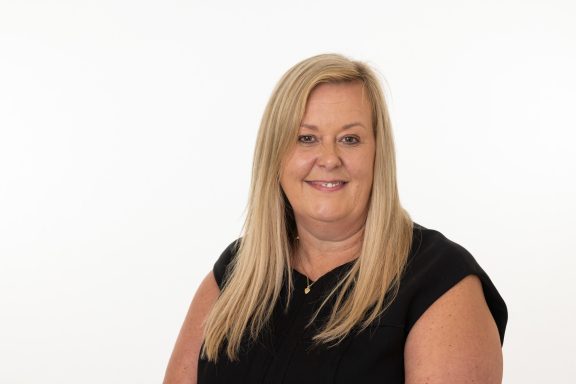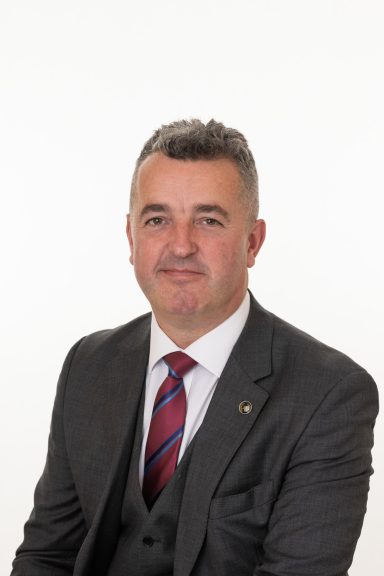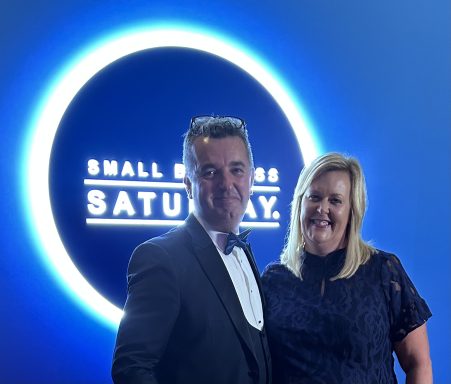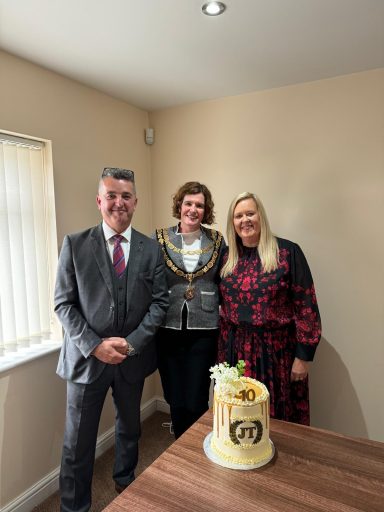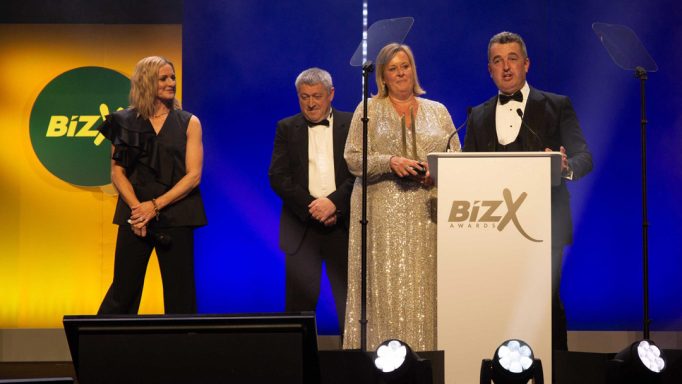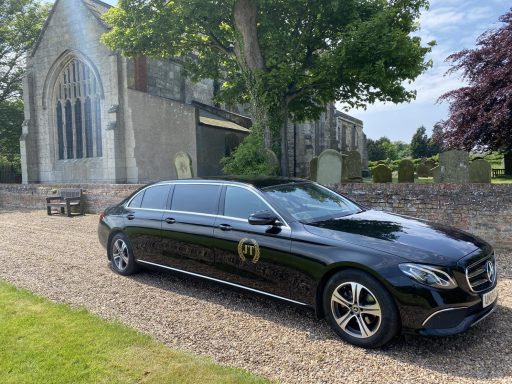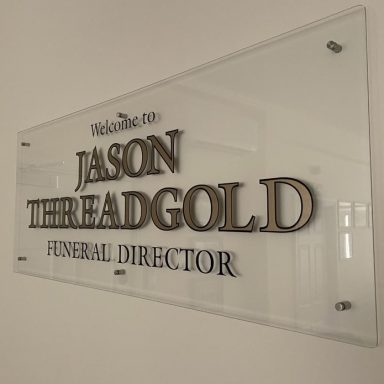Jason Threadgold
Funeral Director
Jason Threadgold Funeral Director is Scunthorpe, Barton, Brigg, Scartho and Caistor's only independently-owned funeral home with no other partners. Run by us, Jason and Nichola Threadgold, a husband and wife team who have grown up locally and know both the area and the community well.
Together, we have over 40 years’ experience working in funeral services, assisting North & North East Lincolnshire families with all aspects of bereavement, including funeral planning, memorials, advice, support and much more.
With a shared desire to continue providing local families with the bereavement care and attention they deserve, we felt the need to open a family-run funeral home. Our Scunthorpe funeral home opened in September 2014, with funeral homes opening in Barton in 2017, Brigg in 2022, Scartho in 2023 and most recently in Caistor in January 2024.
Community is at the heart of what we do and we not only help grieving families, we work a lot with the wider local community with a range of sponsorships and charity work, from hospices to local rising sport stars. We are a family business from the area and therefore love it when we can give back and support others locally. It is an important part of who we are.

Opening Hours
As Funeral Directors we offer a 24hr on call system, at your time of need. The office itself is open Monday to Friday - 9.00am to 5.00pm, at Barton-upon-Humber.
Should you require our services out of office hours you are more than welcome to call us on 01652 661100 for immediate assistance.
You can also visit our website by following this link.
Jason Threadgold Funeral Director: Independent & Family Owned
- Mon – Sun
- 24h
Gallery
Jason Threadgold Funeral Director
At Jason Threadgold Funeral Director - we are here for you 24hrs a day.
Contact us
27 King Street, Barton-upon-Humber, Nth Lincs, DN18 5ER.
Tel: (01652) 661100
Testimonials
We are always humbled to hear such heartwarming words of appreciation from our clients. We strive to always provide the highest possible standard of care and support for all our families during some of the hardest times of their life. The fact that so many of our customers get in touch afterwards to say thank you for our work makes what we do even more special, and we are always grateful to have been able to help however we can. All the reviews and feedback we get help us continue our commitment to providing the best service possible.
Exceptional service from a lovely family who genuinely want to help at a incredibly difficult time.
Considerate, sensitive and patient we were never rushed and always felt comfortable with Jason and Nichola. They helped with questions we hadn't even considered. They cannot do enough for you and nothing is too much effort. Thank you for helping us and giving my dad the wonderful service he deserved.
We recently used Jason for a dear friend's funeral, Jason & his team were so professional from start to finish.
Our friend didn't like wooden coffins so we used an English willow one, it looked lovely. We wouldn't hesitate to recommend Jason & his team who made a very difficult situation a little easier to cope with. Thank you for your professionalism and kindness.
My father recently passed away and had no plan in place for when this happened.
I was recommended Jason Threadgold by his carers, and was not disappointed. Everything was dealt with in an understanding and professional manner, all the arrangements for the funeral were taken out of my hands and we were looked after from start to finish. Would highly recommend and thank you for everything ?
Recent Blog Articles

Understanding Grief
Grief is a completely personal journey but can feel very overwhelming when you are going through it. The feelings don’t just occur when someone has died either, you can grieve after a significant life change, or even at the end of a relationship. While everyone’s journey through grief is unique, many people go through the common stages of grief which are important to understand to help you navigate the healing process.
The Five Stages of Grief
A psychiatrist introduced the five stages of grief back in the late 90s, but these are not specific to everyone and you may feel the emotions in a different order. Not everyone will experience all of the emotions, but they do provide a guide for understanding your feelings after a loss.
1. Denial
The first stage of grief is often disbelief that a loved one is no longer around. People tend to go into shock, and the mind goes into defence mode to protect them from the full impact of the loss. Many people will struggle to accept that the loss has occurred during the early stages of grief and may feel numb or disconnected from reality. Denial allows the grieving person to process the loss slowly, giving them time to adjust before having to deal with the emotions.
2. Anger
Anger shows itself as the reality of the loss starts to kick in. It can be directed at oneself, others or even the person who has died. This anger is often a form of frustration, blaming other people or even a higher power of fate. It is completely natural to feel this emotion, and suppressing it is the worst thing to do as bottling up the pain will just lead to inner turmoil.
3. Bargaining
The bargaining stage is not always felt by everyone who has experienced a loss. This stage is all about gaining control over the situation and often involves ‘what if’ statements when replaying the events leading up to the death. Just like all of the stages of grief, this is a completely normal thought process and is all about trying to undo or avoid the reality of the loss.
4. Depression
This is one of the most challenging stages of grief and is where great sadness, emptiness and even despair are felt. During the depression stage, there is full acceptance of the loss which can lead to overwhelming pain. People often withdraw from others during this period, losing interest in life and feeling very hopeless.
While depression is a normal emotion felt in response to grief, it can be hard to distinguish if or when this becomes clinical and requires medical intervention. If the depression feels unmanageable then professional support should be pursued.
5. Acceptance
Acceptance is the final stage of grief and is where the individual starts coming to terms with the reality of the loss they are facing. It doesn’t mean the person is ‘over’ their grief or has forgotten the deceased, it just signifies a shift towards healing and finding a new way of living without the person who they have lost. During acceptance, new routines may be created and new relationships may start to be forged. The pain of the loss may never fully disappear, but this stage is all about learning to live a fulfilling life rather than be consumed by pain.
Coping With Grief
Grief is an incredibly complex emotion and there is no right or wrong way to get through it. Here are some strategies to help you through this challenging time:
- Seek support: family and friends will be there to guide you through this challenging time, try not to isolate yourself from them.
- Take care of yourself: getting outside in the fresh air and exercising can really help you to compartmentalise the emotions you are feeling. Make sure you are eating and sleeping properly too.
- Allow yourself to feel: don’t hide your emotions, let them all out. Journaling can be a really good way to express yourself.
- Be patient with yourself: grief isn’t linear and doesn’t have a timeline. Give yourself permission to move at your own pace.
Remember, grief is a personal experience and everyone goes through it differently. Try to be kind to yourself and allow yourself to feel all the emotions.

Digital Legacy
The digital age has certainly brought us all closer together, particularly families who are geographically separated from each other. It has also come with its challenges though, like how to deal with the online presence of a loved one who has passed away. It can be incredibly difficult to know how to manage a deceased person’s social media account, and they can often become sources of emotional pain if left unattended. In this blog, we have put together a guide on how to handle the digital legacy of a loved one, in particular with their social media accounts.
What Is A Digital Legacy?
A digital legacy refers to the online footprint a person leaves behind after they have died. This doesn’t just include social media but also means things like emails, personal websites, blogs and other digital assets such as photos and videos. These digital items often provide a source of comfort to those who have lost a loved one but there are security and control issues to consider.
Each social media platform has its own policies regarding what happens when a user dies, so it can be hard to have complete control over what happens.
Why Managing A Digital Legacy Matters
Handling social media accounts after losing someone is probably the last thing on your mind, but it is an important task for several reasons:
- Emotional closure: for family and friends, seeing their loved one’s social media accounts still active can trigger painful memories.
- Privacy & security: leaving accounts unattended can actually pose privacy risks. Hackers or scammers could take advantage of inactive profiles to commit identity theft.
- Preserving memories: social media profiles often have lots of photos and videos on them that have captured meaningful memories. Management of these ensures they are preserved.
Managing Social Media Accounts After A Death
1. Identify all active accounts
The first step to take is to work out how many social media profiles the deceased had. Of course, the most common sites are Facebook, Instagram and TikTok, but don’t forget things like LinkedIn and Pinterest. Their devices will probably have their saved passwords in them, and their browser history will give you an idea of which social media platforms they used the most. Most platforms send regular notification emails so have a look through their email account to find those lesser-known social media platforms.
2. Look at each platform’s policies
Each social media platform has a different policy regarding what happens to the account when someone dies:
- Facebook: there are two options here, you can request deletion of the account or memorialise it instead. A memorialised account remains visible with the word ‘Remembering’ added next to the person’s name. Tributes can be posted but the account can’t be altered in any way.
- Instagram: this offers similar services to Facebook, either memorialisation or deletion which removes the profile entirely.
- Twitter (X): they do not offer memorialisation of accounts, the only option is to request deletion. You will be required to submit a death certificate and prove your relationship to the deceased.
- LinkedIn: this platform allows you to close a deceased person’s account after providing a death certificate. This ensures their profile is no longer discoverable in the professional world.
- YouTube/Gmail: Google offers a service called ‘Inactive Account Manager’ which allows users to pre-select what happens to their accounts if they die. If that has not been set up, family members are able to request access or delete the account.
3. Put together all the necessary documentation
Most social media platforms require you to send specific documentation to process the request to delete or memorialise an account. This often includes a death certificate, proof of relationship (evidence that you are an immediate family member or an executor of the estate), and proof of authority.
4. Consider memorialisation vs deletion
One of the hardest decisions to make is whether to memorialise or delete a loved one’s social media accounts. With memorialisation, you can preserve all the posts, photos and memories for friends and family to remember. This can be both comforting and also painful to receive notifications from a memorialised profile.
On the other hand, deleting accounts can add a sense of finality and bring emotional closure, but it does mean that all previous posts and interactions will completely disappear.
5. Secure digital assets
Before deciding to delete an account it is a good idea to back up any photos, videos or messages that hold sentimental value. Most social media platforms offer data download services so you can hold onto these memories offline. This is the best way for families to cherish the memories without needing to visit a public social media account.
6. Update or close other online accounts
Social media accounts are just one part of a deceased’s digital legacy. There are often other accounts such as email, online shopping and subscription services that also need to be managed. Email accounts are usually fairly easy to manage and are the gateway for accessing other accounts. It may be best to just monitor the email account to check you have gained access to everything else you want.
Remember to cancel any digital subscriptions such as streaming services, online shopping accounts and cloud storage services. Some may offer refunds if the deceased has already paid for the service in advance.
The digital legacy we leave behind is something that should be carefully thought about after losing a loved one. Would they want their accounts to be memorialised, or were they a private person who would prefer their family members to have a record of their personal photos and videos? Taking the steps to handle these digital assets is an essential part of estate management in this modern world. For those still living, planning ahead by specifying your wishes can help save your loved ones from a lot of stress.
©Copyright 2024. All rights reserved.
We need your consent to load the translations
We use a third-party service to translate the website content that may collect data about your activity. Please review the details in the privacy policy and accept the service to view the translations.
